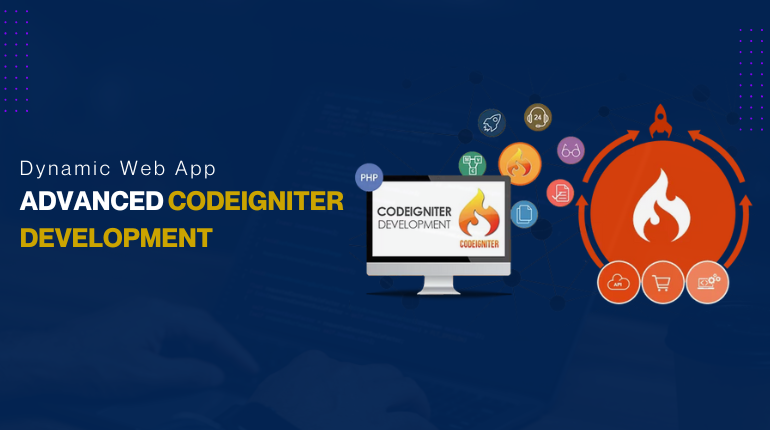CodeIgniter, a popular PHP framework, provides a powerful toolkit for developers to create such applications efficiently. This article explores advanced techniques in CodeIgniter development, helping you maximize performance and feature-rich functionality in your web applications.
1. Understanding the Core of CodeIgniter for Dynamic Applications
CodeIgniter’s lightweight and high-performance design makes it an ideal framework for dynamic applications. At its core, CodeIgniter is built around the MVC (Model-View-Controller) structure, enabling the separation of logic and presentation. This makes the application easier to maintain and more scalable as it grows.
Key Concepts:
- MVC Structure: Separate business logic, data, and presentation to keep code organized and efficient.
- Helpers and Libraries: Use built-in functions and libraries to save time on common tasks, such as handling forms, sessions, and email.
2. Enhancing Performance with Caching Mechanisms
Caching significantly reduces server load and enhances application speed. CodeIgniter provides caching libraries that can be easily integrated to store data temporarily.
Types of Caching:
- Page Caching: Stores a copy of the page after the first load, minimizing repeated requests.
- Query Caching: Reduces database load by caching frequently executed queries.
- Data Caching: Allows caching of specific data sets, which can be particularly useful for heavy data processing.
- Implementation: Use CodeIgniter’s built-in caching library to activate caching on critical parts of your application.
3. Database Optimization and Query Building
Efficient database handling is critical for any dynamic application. CodeIgniter offers a powerful query builder that simplifies SQL query creation while maintaining high performance.
Advanced Database Tips:
- Optimize Queries: Use indexes, limit data fetches, and avoid excessive joins.
- Use Transactions: Maintain data integrity in cases where multiple database changes are needed by using CodeIgniter’s transaction methods.
- Database Migrations: Use migrations to manage database versions and track schema changes easily.
4. Implementing RESTful APIs for Greater Flexibility
RESTful APIs allow CodeIgniter applications to interact with external systems and provide an API-based approach for frontend integration.
Steps to Implement:
- Set Up Routes: Define API routes for easy access and control.
- Create Controllers for API Endpoints: Handle data requests and responses in dedicated controllers.
- Ensure Security: Use token-based authentication to secure API access.
5. Improving Security with CodeIgniter’s Built-in Tools
Security is a priority in web development, especially for dynamic applications that interact with databases and user data. CodeIgniter offers several built-in features to help protect against common vulnerabilities.
Security Features:
- XSS filtering: prevents cross-site scripting attacks.
- CSRF Protection: Secures form submissions against cross-site request forgery.
- Data Validation and Sanitization: Clean incoming data to prevent SQL injections and other malicious inputs.
6. Boosting User Experience with AJAX and Asynchronous Loading
AJAX makes reactive data loading possible, which enhances your application’s speed. Parts of the page may be dynamically updated with CodeIgniter using AJAX without needing a complete refresh.
AJAX Techniques:
- Use jQuery or Vanilla JavaScript: Implement AJAX calls to handle data without refreshing the page.
- Load Data Dynamically: Implement real-time search suggestions, form validations, and content updates for a seamless user experience.
7. Using CodeIgniter’s Task Scheduling for Automation
Automation is a powerful feature for handling repetitive tasks. CodeIgniter supports task scheduling, which allows you to set automated tasks to run at specific intervals.
Examples of Scheduled Tasks:
- Data Backups: Schedule daily or weekly data backups for application security.
- Email Notifications: Automatically send notifications to users based on specific actions.
- Data Cleanup: Remove outdated or temporary data to optimize your database.
Conclusion: Unlocking the Full Potential of CodeIgniter
CodeIgniter provides a flexible and efficient framework to build dynamic web applications with advanced functionalities. By leveraging techniques such as caching, optimized database management, RESTful API integration, and AJAX, you can create a seamless user experience and achieve optimal performance. With CodeIgniter, developers have the tools to build powerful, scalable applications that can adapt to modern user demands.
Ready to implement innovative techniques in your next project? Partner with XcelTec to build dynamic, high-performance applications using CodeIgniter. Let’s turn your vision into reality get started with us today!
For More Information, Visit Our Website: https://www.xceltec.com/
 :
https://www.pinterest.com/xceltec0192/
:
https://www.pinterest.com/xceltec0192/












